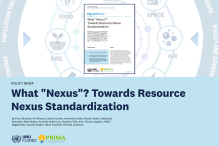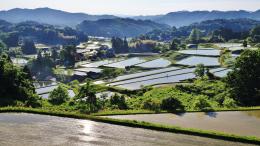On 23 August 2021, UNU-IAS hosted an interactive discussion session on the topic of ‘Building Resilience in Water Management with Multi-stakeholder Engagement’ at the annual World Water Week conference organized by Stockholm International Water Institute (SIWI). The session was a joint effort between four UNU institutes, which form a part of the UNU Water Network (UNU-FLORES, UNU-INRA, UNU-EHS and UNU-IAS) in partnership with EURAC Research Bolzano, to showcase UNU commitment for water and provide learning on multiple paths to achieve resilience in water management. Over 60 international participants joined the discussion and exchanged views on water and resilience.
During the opening remarks, Shinobu Yume Yamaguchi (Director, UNU-IAS) emphasised the importance of SDG 6 ‘ensuring the availability and sustainable management of water for all’ as a means to build the capacity of societies against the most pressing challenges facing humankind today: climate and COVID-19. Kensuke Fukushi (Academic Programme Officer, UNU-IAS) spoke on the concept of resilience and sustainability, focusing on societies that are more resilient to water-related challenges through scientific data collection, model development, scientific tools for future projection, and stakeholder involvement.
The highlight of the session was the breakout discussion to exchange views and ideas with participants on four approaches to achieving resilience presented by speakers from United Nations University (UNU). These are the interactions between highland-lowland systems and its impact on water management and resilience, particularly in a transboundary context; challenges to overcome for wider implementation of water reuse and build resilience; the economic and environmental resilience of the societies through improved water management among multiple users; and youth participation and entrepreneurship in the water sector to advance technologies in urban and peri-urban areas. Active exchange of opinions was observed in each group discussion, reconfirming the importance of multi-stakeholder collaboration, awareness-raising and capacity building, stronger ties between research, policies, and financing, and motivating young entrepreneurs. The session was concluded by Zita Sebesvari (Deputy Director, UNU-EHS) who thanked participants for their contributions to the discussion.
A recording of the session is available on the World Water Week YouTube Channel.
For more information on the UNU Water Network, please visit the UNU website.



